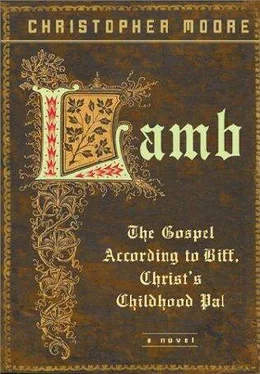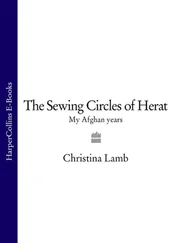“How can you say that? The sacrifices to Kali, the way the Untouchables are treated. Whatever they might believe, in practice their religion is hideous.”
“You’re right. It’s not right to condemn this child because she was not born a Brahman?”
“Of course not.”
“Then is it right to condemn her because she is not born a Jew?”
“What do you mean?”
“A man who is born a gentile may not see the kingdom of God. Are we, as Hebrews, any different from them? The lambs at the temple on Passover? The wealth and power of the Sadducees while others go hungry? At least the Untouchables can reach their reward eventually, through karma and rebirth. We don’t allow any gentile to do so.”
“You can’t compare what they do to God’s law. We don’t sacrifice human beings. We feed our poor, we take care of the sick.”
“Unless the sick are unclean,” Joshua said.
“But, Josh, we’re the chosen. It’s God’s will.”
“But is it right? He won’t tell me what to do. So I’ll say. And I say, no more.”
“You’re not just talking about eating bacon, are you?”
“Gautama the Buddha gave the way to people of all births to find the hand of God. With no blood sacrifice. Our doors have been marked with blood for too long, Biff.”
“So that’s what you think you’re going to do? Bring God to everyone?”
“Yes. After a nap.”
“Of course, I meant after a nap.”
Joshua held the little girl so I could see her face as she slept on his shoulder.
When the children awoke we led them back to their families at the pits, handing them into the arms of their mothers, who snatched each child away from us as if we were devils incarnate; they glared over their shoulders as they carried the babies back to their pits.
“Grateful bunch,” I said.
“They are afraid that we’ve angered Kali. And we’ve brought them another hungry mouth.”
“Still. Why did they help us if they didn’t want their children back?”
“Because we told them what to do. That’s what they do. What they are told. That’s how the Brahmans keep them in line. If they do what they are told, then perhaps they will not be Untouchables next life.”
“That’s depressing.”
Joshua nodded. We only had little Vitra to return to her father now, and I was sure that Rumi would be happy to see his daughter. His distress over losing her had basically been the reason he had saved our lives. As we came over the sandstone rise we could see that Rumi was not alone in his pit.
Rumi stood on his sitting rock, stark naked, sprinkling salt on his erect member as a large humpbacked cow, which nearly filled the rest of the pit, licked at the salt. Joshua held Vitra so she faced away from the pit, then backed away, as if he didn’t want to disturb the moment of beefy intimacy.
“A cow, Rumi?” I exclaimed. “I thought you people had beliefs.”
“That’s not a cow, that’s a bull,” Joshua said.
“Oh, that’s got to be your super-bonus abomination there. Where we come from whole cities get destroyed for that kind of thing, Rumi.” I reached over and put my hand over Vitra’s eyes. “Stay away from Daddy, honey, or you’ll turn into a pillar of salt.”
“But this is my wife, reincarnated.”
“Oh, don’t try that one on me, Rumi. For six years I lived in a Buddhist monastery where the only female company was a wild yak. I know from desperate.”
Joshua grabbed my arm. “You didn’t?”
“Relax, I’m just making a point. You’re the Messiah here, Josh. What do you think?”
“I think we need to go to Tamil and find the third magus.” He set Vitra down and Rumi quickly pulled up his loincloth as the child ran to him. “Go with God, Rumi,” Joshua said.
“May Shiva watch over you, you heretics. Thank you for returning my daughter.”
Joshua and I gathered up our clothes and satchels, then bought some rice in the market and set out for Tamil. We followed the Ganges south until we came to the sea, where Joshua and I washed the gore of Kali from our bodies.
We sat on the beach, letting the sun dry our skin as we picked pitch out of our chest hairs.
“You know, Josh,” I said, as I fought a particularly stubborn gob of tar that had stuck in my armpit, “when you were leading those kids out of the temple square, and they were so little and weak, but none of them seemed afraid…well, it was sort of heartwarming.”
“Yep, I love all the little children of the world, you know?” “Really?”
He nodded. “Green and yellow, black and white.”
“Good to know—Wait, green?”
“No, not green. I was just fuckin’ with you.”
Tamil, as it turned out, was not a small town in southern India, but the whole southern peninsula, an area about five times the size of Israel, so looking for Melchior was akin to walking into Jerusalem on any given day and saying, “Hey, I’m looking for a Jewish guy, anyone seen him?” What we had going for us was that we knew Melchior’s occupation, he was an ascetic holy man who lived a nearly solitary life somewhere along the coast and that he, like his brother Gaspar, had been the son of a prince. We found hundreds of different holy men, or yogis, most of them living in complete austerity in the forest or in caves, and usually they had twisted their bodies into some impossible posture. The first of these I saw was a yogi who lived in a lean-to on the side of a hill overlooking a small fishing village. He had his feet tucked behind his shoulders and his head seemed to be coming from the wrong end of his torso.
“Josh, look! That guy is trying to lick his own balls! Just like Bartholomew, the village idiot. These are my people, Josh. These are my people. I have found home.”
Well, I hadn’t really found home. The guy was just performing some sort of spiritual discipline (that’s what “yoga” means in Sanskrit: discipline) and he wouldn’t teach me because my intentions weren’t pure or some claptrap. And he wasn’t Melchior. It took six months and the last of our money and we both saw our twenty-fifth birthdays before we found Melchior reclining in a shallow stone nook in a cliff over the ocean. Seagulls were nesting at his feet.
He was a hairier version of his brother, which is to say he was slight, about sixty years old, and he wore a caste mark on his forehead. His hair and beard were long and white, shot with only a few stripes of black, and he had intense dark eyes that seemed to show no white at all. He wore only a loincloth and he was as thin as any of the Untouchables we had met in Kalighat.
Joshua and I clung to the side of the cliff while the guru untied from the human knot he’d gotten himself into. It was a slow process and we pretended to look at the seagulls and enjoy the view so as not to embarrass the holy man by seeming impatient. When he finally achieved a posture that did not appear as if it had been caused by being run over by an ox cart, Joshua said, “We’ve come from Israel. We were six years with your brother Gaspar in the monastery. I am—”
“I know who you are,” said Melchior. His voice was melodic, and every sentence he spoke seemed as if he were beginning to recite a poem. “I recognize you from when I first saw you in Bethlehem.”
“You do?”
“A man’s self does not change, only his body. I see you grew out of the swaddling clothes.”
“Yes, some time ago.”
“Not sleeping in that manger anymore?”
“No.”
“Some days I could go for a nice manger, some straw, maybe a blanket. Not that I need any of those luxuries, nor does anyone who is on the spiritual path, but still.”
“I’ve come to learn from you,” Joshua said. “I am to be a bodhisattva to my people and I’m not sure how to go about it.”
Читать дальше










